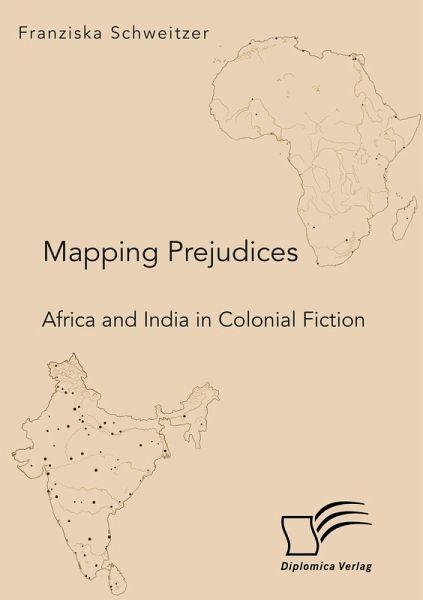
Mapping Prejudices. Africa and India in Colonial Fiction (eBook, PDF)
Sofort per Download lieferbar
Statt: 39,50 €**
29,99 €
inkl. MwSt. und vom Verlag festgesetzt.
**Preis der gedruckten Ausgabe (Broschiertes Buch)
Alle Infos zum eBook verschenkenWeitere Ausgaben:

PAYBACK Punkte
0 °P sammeln!
Africa, the "Dark Continent" and India, the "Jewel of the Crown" - both British colonies, both home to hundreds of different cultures and ethnicities, yet both can be reduced to two distinct catchphrases that trigger an avalanche of pictures and associations. "But they never say no" was an exclamation of utter disbelief when the Mutiny of 1857 took the Indian Raj by complete surprise. That the Zulus or Xosa started another raid or war, on the other hand, was somewhat expected of the "African subaltern". Why and how all these ethnicities were lumped together under two such very different views ...
Africa, the "Dark Continent" and India, the "Jewel of the Crown" - both British colonies, both home to hundreds of different cultures and ethnicities, yet both can be reduced to two distinct catchphrases that trigger an avalanche of pictures and associations. "But they never say no" was an exclamation of utter disbelief when the Mutiny of 1857 took the Indian Raj by complete surprise. That the Zulus or Xosa started another raid or war, on the other hand, was somewhat expected of the "African subaltern". Why and how all these ethnicities were lumped together under two such very different views can be explained by taking a closer look at the landscapes found in the literature of colonial fiction. This work shows how novels and romances of colonial fiction have shaped and perpetuated images and prejudices via the descriptions of landscapes they contain.
Dieser Download kann aus rechtlichen Gründen nur mit Rechnungsadresse in A, B, BG, CY, CZ, D, DK, EW, E, FIN, F, GR, HR, H, IRL, I, LT, L, LR, M, NL, PL, P, R, S, SLO, SK ausgeliefert werden.













